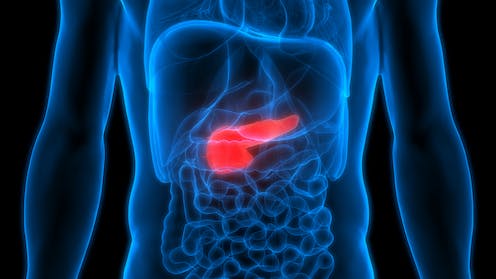
Magic mine/Shutterstock
Every year, more than 10,000 people in the UK are diagnosed with pancreatic cancer. Unfortunately, for most of those people, the disease is diagnosed too late to be cured. Less than 10% of people live five years following a diagnosis.
Pancreatic cancer is a silent disease. For many people, it has no symptoms until it is fairly advanced. Weight loss and increased blood glucose levels are known signs, but it has been unknown – until now – when these changes occur and to what extent. If we can better understand how and when these changes happen before pancreatic cancer diagnosis, we can use this knowledge to diagnose the disease earlier and potentially, in the future, save the lives of some of the people affected by this deadly disease.
In the largest study of its kind, published in PLOS ONE, researchers at the University of Surrey, together with researchers at the University of Oxford, investigated known signs of pancreatic cancer – weight loss, high blood sugar and diabetes – and looked at when they develop in relation to cancer. To undertake this research, we used a large dataset of more than 10 million people in England. The large size of the dataset was important to ensure that our findings represent the whole population. We extracted the information on pancreatic cancer diagnosis and the three attributes of interest and investigated how they change for people over time.
We compared the body-mass index (for weight loss) and HbA1c (for blood sugar) of nearly 9,000 people diagnosed with pancreatic cancer with those of a group of nearly 35,000 people who did not have the disease. We found that dramatic weight loss in people with pancreatic cancer started as early as two years before they received a diagnosis.
At the time of diagnosis, the average BMI of people with pancreatic cancer was nearly three units lower than people who did not have cancer. Raised glucose levels were detected even earlier – from three years before the diagnosis.
Our analysis revealed that weight loss in people with diabetes was associated with a higher risk of developing pancreatic cancer than in people without diabetes. And increasing glucose levels in people without diabetes was associated with a higher risk of pancreatic cancer than in people with diabetes.
The results suggest that unexplained weight loss, mainly in people with diabetes (but not exclusively) should be treated with suspicion. Also, increasing glucose levels, especially in people without weight gain, should be considered a potential red flag for pancreatic cancer.
These changes are important candidates for health checks that, if performed regularly, could help doctors identify people who may have undiagnosed pancreatic cancer. These people could be then referred to a hospital specialist for an abdominal scan to check for cancer.
The benefit of receiving an early diagnosis is that it reduces the chance of the cancer spreading and helps ensure patients are fit enough to withstand treatment.
Where we go from here
In our study, we looked at average rates. It would be important in the future to delve deeper into data and investigate individuals or groups of people who are more likely to experience weight loss and increased glucose levels. This approach could then focus on helping those people.
We are also looking to build this information into a more complex tool (an algorithm) that doctors could use. Using weight and glucose changes together, and potentially incorporating other key symptoms of pancreatic cancer (dark urine, light stool, yellow skin), is more powerful than looking at each of these measures separately. Such a tool could be a powerful way to improve early diagnosis and save lives.
![]()
Agnieszka Lemanska receives funding from Pancreatic Cancer Action, Registered charity in England & Wales (1137689) and in Scotland (SCO49777).























